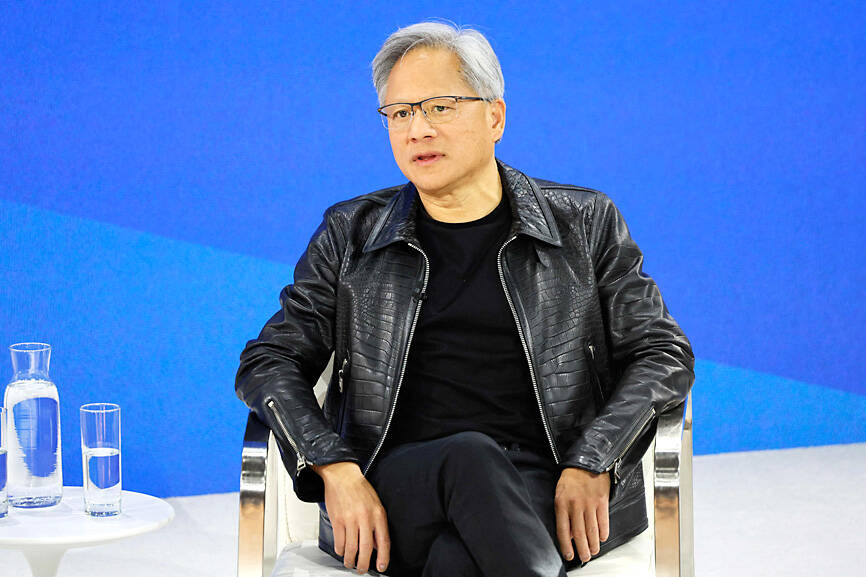Nvidia Corp CEO Jensen Huang (黃仁勳), who runs the semiconductor industry’s most valuable company, said the US is as much as 20 years away from breaking its dependence on overseas chipmaking.
Huang, speaking at the New York Times’ DealBook conference in New York on Wednesday, explained how his company’s products rely on myriad components that come from different parts of the world — not just Taiwan, where the most important elements are manufactured.
“We are somewhere between a decade and two decades away from supply chain independence,” he said. “It’s not a really practical thing for a decade or two.”

Photo: AFP
The outlook suggests there is a long road ahead for a key US President Joe Biden administration objective — bringing more of the chipmaking industry to US shores.
Biden has championed bipartisan legislation to support the building of manufacturing facilities in the US, and many of the biggest companies are planning to expand their US operations. That includes Taiwan Semiconductor Manufacturing Co (台積電), Nvidia’s top manufacturing partner, as well as Samsung Electronics Co and Intel Corp.
Europe is also pushing to build more manufacturing locally. It is part of an attempt to roll back decades of globalization that has scattered production across the world, but has also led to chokepoints in areas such as Taiwan and South Korea.
Separately, Huang reaffirmed his company’s commitment to China — still the largest market for chips. The company lost the ability to sell its most powerful artificial intelligence (AI) processors to the country after the US government imposed export restrictions, and then further tightened them last month. Washington believes that such steps are needed to protect national security.
Following the announcement of the latest rules, Nvidia is working on products for China that will not trigger restrictions, Huang said.
“We have to come up with new chips that comply with the regulation, and once we comply with the regulation, we’ll go back to China,” he said. “We try to do business with everybody we can. On the other hand, our national security matters. Our national competitiveness matters.”
He also cautioned against the unintended consequences of such rules. There are as many as 50 companies in China that are now working on technology that would compete with Nvidia’s offerings, he said.
Meanwhile, Huang said at the conference that artificial general intelligence (AGI) would be “fairly competitive” with humans in as few as five years.
When asked if AGI could be achieved in 10 years, Huang said it could happen even sooner.
“Depending on how you define it, I think the answer is yes,” Huang said. “If we define AGI as a piece of software — a computer that can take a whole bunch of tests and these tests reflect basic intelligence — and by completing those tests deliver results fairly competitive to a normal human, I would say that within the next five years, you can see AIs that can achieve those tests.”

Shares in Taiwan closed at a new high yesterday, the first trading day of the new year, as contract chipmaker Taiwan Semiconductor Manufacturing Co (TSMC, 台積電) continued to break records amid an artificial intelligence (AI) boom, dealers said. The TAIEX closed up 386.21 points, or 1.33 percent, at 29,349.81, with turnover totaling NT$648.844 billion (US$20.65 billion). “Judging from a stronger Taiwan dollar against the US dollar, I think foreign institutional investors returned from the holidays and brought funds into the local market,” Concord Securities Co (康和證券) analyst Kerry Huang (黃志祺) said. “Foreign investors just rebuilt their positions with TSMC as their top target,

REVENUE PERFORMANCE: Cloud and network products, and electronic components saw strong increases, while smart consumer electronics and computing products fell Hon Hai Precision Industry Co (鴻海精密) yesterday posted 26.51 percent quarterly growth in revenue for last quarter to NT$2.6 trillion (US$82.44 billion), the strongest on record for the period and above expectations, but the company forecast a slight revenue dip this quarter due to seasonal factors. On an annual basis, revenue last quarter grew 22.07 percent, the company said. Analysts on average estimated about NT$2.4 trillion increase. Hon Hai, which assembles servers for Nvidia Corp and iPhones for Apple Inc, is expanding its capacity in the US, adding artificial intelligence (AI) server production in Wisconsin and Texas, where it operates established campuses. This

H200 CHIPS: A source said that Nvidia has asked the Taiwanese company to begin production of additional chips and work is expected to start in the second quarter Nvidia Corp is scrambling to meet demand for its H200 artificial intelligence (AI) chips from Chinese technology companies and has approached contract manufacturer Taiwan Semiconductor Manufacturing Co (TSMC, 台積電) to ramp up production, sources said. Chinese technology companies have placed orders for more than 2 million H200 chips for this year, while Nvidia holds just 700,000 units in stock, two of the people said. The exact additional volume Nvidia intends to order from TSMC remains unclear, they said. A third source said that Nvidia has asked TSMC to begin production of the additional chips and work is expected to start in the second

US President Donald Trump on Friday blocked US photonics firm HieFo Corp’s US$3 million acquisition of assets in New Jersey-based aerospace and defense specialist Emcore Corp, citing national security and China-related concerns. In an order released by the White House, Trump said HieFo was “controlled by a citizen of the People’s Republic of China” and that its 2024 acquisition of Emcore’s businesses led the US president to believe that it might “take action that threatens to impair the national security of the United States.” The order did not name the person or detail Trump’s concerns. “The Transaction is hereby prohibited,”